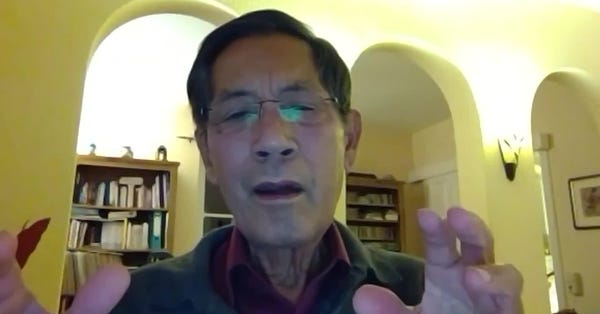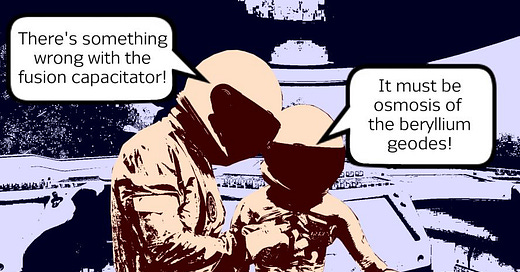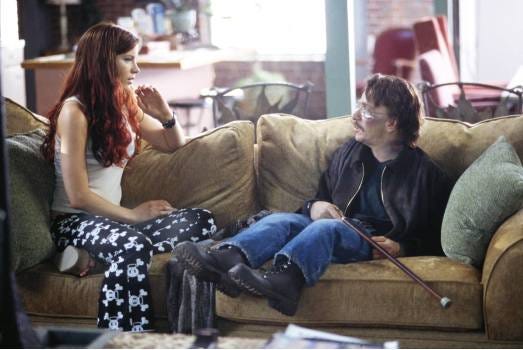Science Blah-Blah Horseshit is the Universal Language of Covid
And it's why we need to be able to trust institutions
South Africa, home of the omicron variant (the trademark’s still open on that phrase, South Africa!), is only 22 percent vaccinated. It’s not because they lack doses; they’ve been turning away vaccine shipments. It’s because much of their population, like much of ours, doesn’t trust the vaccine. Why not? Well, according to South African-based writer Eve Fairbanks, it’s partly because of general vaccine skepticism and partly because of the Global Covid Bullshit Industrial Complex:

I checked out Nick Hudson’s twitter feed, and I’d like to reiterate something I’ve said before: Twitter really needs an “ironic hate-scroll” mode. After checking out Dr. Nick’s1 feed, my algorithm is full of ultra-libertarian fringe-y garbage. Every digital anything needs “ironic mode”; for example, Netflix needs to not alter my algorithm when I watch Tiptoes, the 2003 film in which Gary Oldman plays a dwarf by walking around with shoes on his knees, Dorf On Golf-style.
Nick Hudson’s Twitter feed is an anti-vaccine bullshit factory. Hudson doesn’t exist in a Joe Rogan-esque “just-asking-questions-in-a-maybe-not-very-responsible-way” grey area; he straight-up thinks the pandemic is a hoax. He retweeted someone calling Covid-19 a “fakedemic” (clever!) and has passed along pearls of wisdom such as this:
HOLY SHIT HE’S RIGHT!!! And what’s more: “Coronavirus” is an anagram for “US Raccoon Irv”! And “Ruminator Dan” is an anagram for “Romanian Turd”! WE ARE THROUGH THE LOOKING GLASS HERE PEOPLE!!!
One way Hudson sows mistrust is by spreading outlier opinions from people with legit-sounding credentials. These people often use vocabulary that’s unfamiliar to just about everyone:



I don’t know what “codon optimizations” are or what a “mucosal immune response” is. I’m a Joke Elf, not a doctor. I honestly can’t differentiate those tweets from one from a source I trust like this:

My brain processes those words as: “Science science science B.1.1.529 science variant the science how science.” The tweet performs basically the same function as Star Trek lines like “We’re synthesizing the dilithium crystals into the hyperdrive reactors” — it’s just a bunch of speech-like clattering that tells the audience that advanced science stuff is happening. Would it have made any difference if Star Trek had manufactured a scientifically accurate sentence? I seriously doubt it; I, for one, had to google “dilithium crystals” to see if they’re real (no, God damn it). To the untrained ear, the “science blah blah whatever” version works just as well as the genuine article.
Unless you’re a virologist or an epidemiologist, you’ve spent this pandemic trusting other people. I have, and I’m not embarrassed about it; I’m proud of the decade I spent in clown college, and I don’t consider myself dumb just because my expertise lies in knowing why “barf” is funnier than “vomit” instead of in the finer points of virology. In fact, I think there’s a certain wisdom to knowing that my degree from the Chicago Institute of Balloon Animals and Squirty Boutonnières does not prepare me to “do my own research”. Different people have different levels of fluency in the language of a pandemic, but almost all of us will, on some level, be relying on social trust.
Which is why “follow the science” doesn’t quite work. Which science? The science we deem credible depends on who we trust. Personally, my social trust in institutions like the FDA and the CDC was formed in part by the eight years I spent working in the federal government. That experience taught me two things: 1) Most federal employees are honest, capable people; 2) There’s a certain amount of hard-wired institutional dumbassery that makes large-scale conspiracy impossible. Which is to say: 1) Nobody where I was wanted to execute an evil conspiracy, and 2) We couldn’t have pulled one off even if we had wanted to. I know for a fact that the government isn’t doing things like implanting people with microchips, and I know this because in my office, two-sided printing pretty much kicked our asses. There’s no chance that atomic-level robotics will be mastered by the same people who don’t know how to mute their fucking line on a conference call.
There’s some evidence that we’re living in a time of low institutional trust, especially in government. Strangely, the high ebb of trust is usually thought to be the post-WWII era; apparently, nothing earns the public’s trust like putting people in internment camps and developing civilization-ending technology entirely in secret. The point is: Institutional trust is low, and it’s not likely to soon recapture the heights it enjoyed in the ‘40s, a time when the press colluded with the White House to hide the fact that the president couldn’t walk.
Of course, some amount of skepticism is good. I’ve identified myself as a person who’s inclined to trust government institutions, but that trust is far from absolute; I know that the military lies all the time and I’m well-versed in the ways government makes bad decisions. It would be naïve to blindly trust any institution. I’m probably like most people: My trust waxes and wanes depending on what the institution does. Trust has to be earned.
That’s why I think the CDC’s missteps during the pandemic have outsized importance. I’ll highlight two highly visible and much-criticized moments: The CDC’s early-pandemic statements questioning the efficacy of masks and Dr. Fauci’s admission to the New York Times that he adjusted his statements about what level of resistance was necessary for herd immunity based partly on what he thought the public was “ready to hear”.
I think I understand the logic behind these decisions. Early in the pandemic, the CDC was worried about people buying up already-scarce N95 masks that were needed for medical workers; there was also a concern that “reduces the likelihood of transmission” would be interpreted as “makes you completely safe”. Regarding herd immunity, Dr. Fauci was worried that if he said we needed to get to 90 percent, it would trigger what I’ll call a “well then fuck everything” response that would make people less likely to get vaccinated. I get that these decisions were made with several factors in mind, and I think they were made with good intentions.
But I also think they were extremely wrong. The effects of these decisions went far beyond whatever short-term confusion they might have caused; the main effect was to degrade the CDC’s credibility. And since virtually all of us are operating on trust, every bit of credibility lost by the CDC made more people susceptible to the siren call of the Global Covid Bullshit Industrial Complex.
Consider how difficult this makes the argument for people like me, i.e. dinosaur liberals who mostly trust the CDC and wish we could trust it more.
Me: The CDC says you’re safer with a vaccine than without one.
Other person: The CDC lied about masks and herd immunity.
Me: Okay, yes, they did, and I agree that that was bad. But I would argue that those statements don’t negate their position on vaccines — can I talk for a moment about how vaccine approval is a data and consensus-driven process?
Other person: Do not do that.
Me: Are you sure?
Other person: I will hit you with wood if you do that.
Me: Fair enough — have a nice day!
There’s a similar problem regarding the mainstream media (which I’ll define as the New York Times, the Washington Post, NPR, CNN and a few others). There’s a debate right now — mostly pointedly between Andrew Sullivan and Jonathan V. Last — about how much the mainstream media can be trusted. Sullivan argues that their credibility is basically gone; Last thinks that they’re about the same level of imperfect that they’ve always been. I’m basically in between the two; I think the Times and Post are the worst they’ve been in my lifetime, but they’re not complete bird cage liner just yet. Still, the change is significant; the difference between a Times I trust 90 percent and a Times I trust 75 percent is the difference between me using them as my go-to source for information and me seeking other sources for that role.
In the past year or two, we saw a major push for institutions to reflect a particular ideology; many people argued that institutions preaching neutrality should instead “take on a social justice role”. It happened in some corners of the media, several organizations, and many universities. Scientific touchstones like the American Medical Association and Science-Based Medicine had weird moments. The ACLU’s purpose seems to have dramatically changed. The result has been a degrading of institutions’ credibility, both individually and collectively. To the extent than institutions have accepted this change in purpose, people no longer trust them to provide the truth. That’s rational, because an institution that declares that its purpose is to pursue “social justice” as defined by a narrow set of activists has disavowed the pursuit of truth and declared loyalty to a predetermined set of beliefs.
I feel that institutions chronically undervalue their credibility. I think that was the driver behind the CDC decisions on masks and herd immunity; I think they had “an outcome I’m seeking” on one side of the ledger and “our long-term credibility” on the other side, and they didn’t realize that that latter should far outweigh the former. I think this happens all the time; I think whenever a university ties itself in knots over some rinky-dink campus flare-up, they lose credibility. Whenever a publication shies away from facts that might upset their audience, they lose credibility. This loss of trust isn’t a small thing; it’s enormous, because society needs a common set of facts that we can use to make decisions. Every person cut adrift by sloppy dissembling is a candidate to be seduced by a true-sounding narrative that just might be weapons-grade bullshit.
Institutions make mistakes; that’s inevitable. But trust waxes and wanes depending on the frequency and size of those mistakes. It would be nice if there were advanced statistics for institutional performance like there are for baseball; I wonder what the CDC’s Value Over Some Random Asshat On Facebook (VOSRAOF) would be in the past year. I worry that it might not be very high. It seems like restoring credibility should be a top priority, because if people don’t listen to the CDC, then they’re likely to listen to some guy on YouTube saying “the krypton metachlorians in the OPP-sequence from the Freedonia Institute indicate that vaccines are definitely not safe!”
Nick Hudson is NOT a doctor. But Dr. Nick from The Simpson’s isn’t really a doctor, either.







I think your points about working for the government are insightful: You couldn't pull off a conspiracy if you wanted to. You also couldn't pull off any ambitious project at all.
So I'm not sure how much being correct leads to credibility. Impressive results lead to credibility. You have no choice but to respect an institution capable of the Manhattan project or Apollo missions. Even if you disagree with every aspect of it. A lot of people alive today probably can't think of a single impressive thing they've seen a modern institution do.
The other credibility killer is that the public now recognizes these institutions as made up of distinct and flawed humans. The NYT is now just a bunch of people on twitter posting dumb shit about their lives. If they really wanted to restore credibility the first step would be to ban all reporters from having public social media accounts. The correct places for those opinions is the opinion pages. Of course that will never happen.
"In the past year or two, we saw a major push for institutions to reflect a particular ideology; many people argued that institutions preaching neutrality should instead “take on a social justice role” ....The result has been a degrading of institutions’ credibility, both individually and collectively. To the extent than institutions have accepted this change in purpose, people no longer trust them to provide the truth. That’s rational, because an institution that declares that its purpose is to pursue “social justice” as defined by a narrow set of activists has disavowed the pursuit of truth and declared loyalty to a predetermined set of beliefs."
I feel like I've said this same thing with SO many Substacks and podcasts by now, but thank you thank you THANK YOU for making me feel like I'm not going crazy. This incredibly mean, domineering, overbearing "woke" ideology has made feel incredibly alienated, and since I have no desire to ever look in the GOP's direction, I've spent the last few years feeling adrift. Thank you for doing what you do.